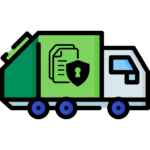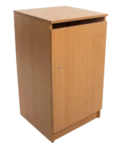Confidential waste collection
Save money on your confidential waste collections today
Just enter your business postcode…
Save money on your confidential waste collections today
Just enter your business postcode…
Start saving now
Confidential waste disposal is a crucial aspect of data security for businesses. It involves the secure handling and disposal of sensitive information and documents.
Leaks of confidential information can lead to financial loss, reputational damage, and legal repercussions.
We specialise in helping businesses find the best confidential waste collection services in their area. Below, we cover the key aspects of commercial waste services, including:
Confidential commercial waste collection involves several key steps to ensure the secure handling and disposal of sensitive information. Here’s how it typically works:

Our waste experts will ask you about your business’s confidential waste disposal needs, including the types of confidential materials you generate, the volume of waste produced, and specific security requirements.

The waste management firm provides secure containers for the collection of confidential waste. These containers are typically lockable and tamper-proof to prevent unauthorised access to the contents.

A collection schedule is established based on the needs of your business and the volume of confidential waste generated. Regular pickups may be scheduled to ensure timely disposal.

The waste management firms trained professionals collect the filled confidential waste bins from your business premises on the scheduled dates, using their confidential waste collection vehicles.

Confidential waste is transported to a designated disposal facility using secure vehicles equipped with tracking systems and surveillance measures to monitor the waste’s movement and ensure its security during transit.

At the disposal facility, confidential waste undergoes secure disposal methods such as shredding, incineration, or pulping to render the information irrecoverable. See more on confidential disposal techniques below.

Upon completion of the disposal process, the waste management provider issues a Certificate of Destruction to confirm that the confidential waste has been securely disposed of in accordance with regulatory requirements.
Confidential commercial waste bins are designed with security in mind, featuring robust locking mechanisms to protect sensitive materials.
The size of the bin you need depends on factors such as the volume of confidential waste generated, the frequency of disposal pickups, available space for the bin, and your organisation’s specific requirements.
Here are the most popular confidential waste bins:

Lockable confidential waste bins are made of heavy-duty plastic, available in sizes between 120 and 660 litres, and have a narrow slot to prevent the removal of deposited items.

Shredding cabinets are discreet bins that blend into the office environment. They have a lockable compartment and a narrow disposal slot to ensure security.

A data destruction box is a lockable container used to store e-waste that potentially contains confidential data, such as hard drives, USB sticks, laptops, and CDs.
Confidential waste comes in various forms. Here, we delve into the specifics of each type to understand the importance of secure disposal methods.

Printed materials containing sensitive information such as personal identifiers (names, addresses, date of birth), financial records, medical reports, legal documents and business contracts.

Digital files stored on computers, servers, hard drives, or other electronic devices, including emails, spreadsheets, databases, presentations, customer records, intellectual property, and classified information.

CDs, DVDs, USB drives, magnetic tapes, and other physical storage media used to store electronic data, which may contain sensitive information and require secure disposal to prevent data breaches.

Packaging materials, labels, and product prototypes containing designs, trade secrets, or intellectual property that require secure disposal to prevent unauthorised reproduction or disclosure.

Employee identification cards, access badges, security tokens, and other forms of identification that may contain personal information or access credentials requiring secure disposal when no longer needed.

Medical imaging films, X-rays, and radiographic films containing sensitive patient information must be securely disposed of to comply with healthcare privacy regulations and protect patient confidentiality.
Confidential waste disposal is crucial for industries that handle sensitive information regularly.
Below, we explain the industries that typically use confidential waste collection services and highlight which parts of the country these services are available.

Banks and investment firms handle vast amounts of confidential financial records and transaction data. The UK banking sector is clustered in the cities of London, Edinburgh, and Manchester, where local waste firms offer a range of confidential waste services.

Insurance firms must carefully protect their customers’ sensitive information. The cities of Leeds, Birmingham, and Glasgow are important regional hubs for the UK insurance industry, where local waste firms offer bespoke confidential waste services.

Law firms and legal departments within organisations handle confidential client information, case files, contracts, and other legal documents that require secure disposal to protect client confidentiality.

Governmental departments process a wide range of sensitive data that must be carefully managed using confidential waste collection services. The public sector in the UK is centred in Westminster with devolved administrations in Wales, Scotland and Northern Ireland.

Confidential waste collection in schools, colleges, and universities is important. They collect and store sensitive student and employee records, academic research, and intellectual property that require secure disposal to protect individuals’ privacy.
It’s important to dispose of your confidential waste correctly to:
Companies and organisations that handle large volumes of confidential data typically adopt ISO 27001, an international standard for information security management.
The standard sets out the following best practices for confidential waste disposal:
Generally, onsite confidential waste disposal uses a mobile shredding vehicle. The provider will deliver a secure, lockable container or bin to place your confidential waste in.
A confidential waste specialist will then transport this container or bin to their mobile shredding vehicle, where it is shredded immediately.
You will then receive a waste transfer note and a certificate of destruction confirming all material has been collected and destroyed.
Off-site confidential waste disposal is carried out at a secure destruction centre, where the waste is shredded.
Your waste supplier will provide you with a confidential, secure, lockable container or bin to place your confidential waste in.
A confidential waste specialist will collect your waste on your scheduled collection day. The locked wheelie bin will be securely fastened in the back of a GPS-tracked vehicle and taken to a specialised off-site secure destruction centre, where it will be shredded and then incinerated.
A waste transfer note and certificate of destruction will be supplied, confirming all material has been collected and destroyed.
Electronic waste containing confidential data must be irreversibly destroyed to prevent unauthorised access.
Confidential waste providers typically use the following processes for secure electronic waste destruction: